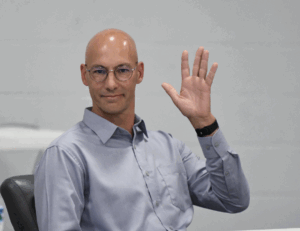
The claim game
A police officer peers through a window when shouting is heard coming from behind the doors guarding the Goldsboro City Council from the public during a pre-board meeting closed session.
It is June 3, 2019, and the elevated voice is that of District 1 Councilman Antonio Williams.
Only those in the room know exactly what was said, but when the board returns to its open, pre-meeting work session, Williams delivers more fireworks.
He tells Mayor Chuck Allen that he does not have “any integrity” and characterizes an investigation into Williams’ conduct as “illegal,” “unethical,” and “a conspiracy.”
“The truth is out there. The truth is out there. Everything else is false. The truth is on the internet. The truth is on the recordings,” Williams says. “You want the truth? Search it out. It’s in emails. … I don’t email this woman. I don’t contact her. I don’t interact with her. I don’t have a personal relationship with her. This is all on city business. This has nothing to do with anything else.”
The woman he is referring to is Community Relations Director Shycole Simpson-Carter who, waiving her lawful right to confidentially, allowed an investigation into her claims against Williams to go public — allegations of verbal abuse inflicted upon her by the councilman during a Goldsboro-Wayne Transportation Authority meeting and a subsequent demand by Williams that she be fired from her post.
The incidents, according to the investigation report, marked the culmination of a yearslong battle between the two — a conflict that saw Simpson-Carter file a complaint with the U.S. Equal Employment Opportunity Commission, Williams face a contentious censure hearing, and the city settle a discrimination lawsuit filed by the Simpson-Carter for $25,000.
And while neither Williams nor Simpson-Carter are still in the roles they held the day that officer peered through a window when shouting was heard coming from behind the doors guarding the Goldsboro City Council from the public during a pre-meeting closed session, a new chapter in the saga that began in early 2017 is unfolding in the courts, as the former councilman is suing the former community relations director and the city government for a myriad of claims, including “defamation” and “malicious prosecution.”
•
According to the results of an independent investigation undertaken after Simpson-Carter filed a formal complaint against Williams, the conflict between the two dates back to at least early 2017 when, the report says, Simpson-Carter was helping, as part of her duties with the city, to develop Goldsboro’s Summer Youth Employment Initiative.
Investigators concluded that the councilman wanted more control over the program — and to have youth workers placed at his business — a request Simpson-Carter perceived as a conflict of interest.
Then, more than a year later, the conflict reached its climax when, at a Sept. 27, 2018, Goldsboro-Wayne Transportation Authority meeting, Williams, according to the investigation report, behaved in an “unacceptable” manner — berating the employee after she told the GWTA board she did everything within her power to ensure 10 individuals who had been displaced by Hurricane Floyd had a roof over their heads after flooding associated with the storm left them without shelter.
But Williams, according to records released in June 2018, told the board the city only footed the bill for a single night at local hotels, that he, not the government, paid for the lodging.
“We got them in a hotel for one night with WAGES’ help, but I had to pay for these individuals’ room and board after they were put back on the street,” a quote attributed to Williams from the meeting reads. “(Simpson-Carter) is lying. I don’t know what receipts she has, but she is lying. The city did not pay for these individuals’ hotel stay on Friday.”
The receipts, however, which were obtained by New Old North as part of a records request, seemingly substantiate Simpson-Carter’s assertion that she did, in fact, pay for several of the residents to spend an additional night at Knights Inn using her city procurement card.
And in addition to the receipts, documents obtained from the city include narratives prepared by the then-community relations director for all 10 individuals — and seemingly vindicate her claim that she followed their cases through.
Williams, on the other hand, supported his version of the events with a receipt for a single room and two receipts from McDonald’s.
•
A week after the back and forth at the GWTA meeting, Williams submitted a handwritten note demanding Simpson-Carter be fired.
“It’s apparent to me that the meeting held after the council meeting in the mayor’s office was to conspire against me. I am requesting that Shycole Simpson-Carter’s employment with the City of Goldsboro be terminated based on her intended act to maliciously destroy the reputation of a City Council official and undermine the citizens of the City of Goldsboro,” it read.
Investigators concluded that the letter “could very well be found to be retaliatory.”
“What the City Council should remember is that the facts in this case are clearly sufficient to put the City (at) risk for liability for allowing further allegedly discriminatory or retaliatory behavior to occur,” the investigation report reads.
And while council members attempted to take steps to address the issue — a process that culminated in a failed July 15, 2020, censure hearing — Simpson-Carter filed a complaint several weeks later with the U.S. Equal Employment Opportunity Commission.
She alleged that Williams was guilty of “severe and pervasive” behavior that “amounted to harassment and hostile work environment based on sex,” which she claimed “adversely impacted (her) job and health.”
And Simpson-Carter also said the city “knew” and “took no action,” a reference to the failure, by a 4-3 vote, of the City Council to censure Williams for his conduct.
“As the city yet again did nothing or said nothing as I tried to be professional and swallow the fact that I was not being treated fair or protected as an African-American female based on the city’s … action not to censure Councilman Williams … I still showed up … to do my job under enormous pressure and stress,” she said in her complaint. “It seems like I … have been living in the pit of hell each day that I am being tortured to the brink of death by Lucifer himself.”
Simpson-Carter would ultimately be awarded $25,000 in a settlement for her “alleged compensatory damages, including alleged pain, suffering and emotional distress” — a deal that allowed the city to deny wrongdoing and resulted in the dismissal of the EEOC complaint.
And despite the fact that, a little more than a year later, she would resign her post and Williams, two weeks after that, would be elected to the Wayne County Board of Commissioners, the saga did not end in the fall of 2020.
It would not be long before Williams filed a lawsuit of his own.
•
In court documents filed Sept. 20, 2022, Williams makes a staggering number of claims against Simpson-Carter and the Goldsboro city government — and asked for a minimum of $125,000 in damages for allegations including “defamation” and “abuse of process” to “malicious prosecution.”
The following are among the nearly 100 “Factual Allegations” listed in the lawsuit and detail claims made by Williams about what happened after he was elected to serve as District 1’s councilman.
Note: This is the actual text from the filing. Spelling and grammatical errors have not been corrected:
• (Williams) was subjected to repeated harassment, mistreatment, deprivation of due process, and abuse as City employees continuously relegated his voice from councilman to nothing more than a nuisance.
• Almost immediately, (Williams) began to be harassed and discriminated against by city employees including then-Mayor Chuck Allen, several councilmembers, the city manager, and the city attorney. All of whom are white males.
• Over the course of the next several years, (Williams) continued to endure defamatory attacks from city employees, and discriminatory treatment as he advocated for the constituents of his district.
• In 2017, (Williams) received a permit to upgrade the storefront of a business he owns and operates within the city. Several other business located on the same street were also upgrading their storefronts and making improvements. Upon information and belief, in or around the summer of 2018, the mayor and a councilman were put on notice that (Williams’) store being upgraded. Subsequently the City of Goldsboro’s Historical Board, revoked (Williams’) building permit. (Williams) was forced to reapply for the permit and was told he could not submit supporting information in his application. Ultimately, (Williams’) application was denied, and he was directed by the city to tear down the newly improved storefront.
• Upon information and belief, a Historical Board member and employee of the City stated to (Williams) that his “…business was not the look [we] wanted for downtown.”
• (Williams) reported his concerns to the mayor, city council, and city manager, but his concerns were ignored.
• Despite his concerns falling on deaf ears, (Williams) still appealed the decision to the oversight board several weeks later. In response, (the city) hired an outside attorney to support their decision to deny his permit.
• Upon information and belief, a councilmember was directed via email by his wife, both of whom are or were Historical Board members and employees of (the city), on how to vote to deny (Williams’) permit.
• Upon information and belief, the email stated she gets “very happy” every time (Williams) suffers at the hands of the City. Such overt behavior is malicious and intentional.
• In or around April of 2018, (Williams) continued to suffer when the city received an “anonymous letter” (emphasis added) complaining of (Williams) that he did not live within the district which he represented.
• Prior to inquiring of (Williams) regarding the false allegation, then mayor Chuck Allen disregarded (Williams’) assertion that he did live within his district, and directed the city attorney to conduct an investigation of Plaintiff Williams.
• The mayor stated he did not believe (Williams), and required (Williams) to submit proof of residency within his district, or lose his seat on the city council.
• (Williams) was forced to hire an attorney to represent his interests.
• Upon information and belief, the mayor and councilmen stated to (Williams) “this is all your fault, why are you making us do this to you” before being informed the process to challenge (Williams) residency was improper.
• (Williams’) residency was challenged shortly following this exchange, by a local citizen who brought the matter to the election board.
• The election board held a preliminary hearing on July 10, 2018, whereby the board determined there was insufficient evidence proving (Williams) lived outside of his district and the residency issues was ultimately settled when the board declined pursuit of a full hearing.
• Despite the repeated attempts to tarnish (Williams’) name and reputation, (Williams) continued to advocate for his constituents by introducing several community-oriented events and/or programs.
• The program entitled “24 Hours of Peace and Wellness” was dismissed by the mayor and council due to their belief the event would make the “minority community violent.”
• (Williams) also introduced a summer youth development program to help impoverished youth develop and learn soft skills. The program directly impacted the citizens Plaintiff represented.
• Again (the city), by and through the authority wielded by its mayor and manager, dismissed (Williams’) program saying “these types of kids have no desire to work.”
• Quite to the contrary, (Williams) was able to gain the support of the community and approximately four hundred (400) youth inquired about the summer employment program.
• When (Williams) voted in favor of the program, City officials including the mayor and city manager, decried his vote was a conflict of interest.
• (Williams) was accused by the city council that he just wanted financial benefits from the program and he was using these summer youth to complete previously denied construction on his personal, residential property.
• The accusation was entirely and utterly false, and city officials were again attempting to disparage and discourage (Williams) from serving his community.
• By way of his role as a councilman, (Williams) located money that was not previously earmarked and inquired about it.
• Upon information and belief, the very next day he was contacted by a community organizer and/or leader. The leader espoused she had partners and if (Williams) inquired about the money again, her partners would make him look like a monkey. The partners were the mayor and city council.
• This behavior continued to plague Plaintiff Williams for his entire duration as a city council member.
• (Williams) had a well documented and contentious professional relationship with (the city’s) community relations director, Shycole Simpson-Carter.
• (Williams) filed a written complaint with the mayor regarding Mrs. Simpson-Carter and her behavior towards (Williams) following a meeting with the Goldsboro Wayne Transportation Authority (GWTA).
• Shortly after filing his complaint, (Williams) happened upon a meeting whereby the mayor, Goldsboro-Wayne Transit Authority board members (“GWTA”), and Simpson-Carter were discussing what they had planned to do to (Williams).
• Carter retaliated by filing a complaint seeking a temporary restraining order against (Williams) in Wayne County District Court, case number 18 CVD-2006.
• Upon information and belief, the city mayor and other city councilmembers desired to have Plaintiff Williams removed from his seat, and exploited the relationship between Simpson-Carter and (Williams) to do so.
• Ultimately, the complaint was resolved in his favor, and dismissed on November 13, 2018.
• Upon information and belief, Defendant Simpson-Carter stated her action seeking relief against Plaintiff Williams, was caused by the mayor and she had received help on her complaint against (Williams) from several city employees.
• Following the dismissal, the mayor and councilmembers made a public statement explaining the dismissal “meant nothing” and (Williams) had “not been cleared” of anything pertaining to Simpson-Carter.
• In continuance of (the city’s) deprivation of his rights, on or about October 10, 2018 an investigation was opened and conducted in hopes of removing (Williams) from the city council. The investigation was conducted by Valerie Bateman, who at the time worked for the Forrest Firm.
• Bateman’s investigation took several months during which she conducted interviews, including of (Williams), and reviewed documents from various sources.
• At the conclusion of her investigation, on or about May 28, 2019, Bateman brought the information before the city council.
• Prior to the council meeting at which she was to present the results of the investigation, she espoused if there was inaccurate information, it could be corrected. When (Williams) voiced concerns over errors, including those specifically regarding himself, but the errors were not corrected.
• Upon information and belief, the mayor and white city councilmen were able to review the report and make changes to it, but (Williams) was taunted with being told he could view it, and ultimately having those statements rescinded for no proper cause.
• The investigative report was nothing more than a fishing attempt to extract information that would aid in (Williams’) political demise.
• Following the release of the report, (the city) pushed forward with a decision to censure (Williams), restrict his access to city hall, and recall his duly earned 2015 election.
• (Williams) was never provided with the ethics violation leading to the censure hearing despite asking the mayor and councilmembers for the same.
• (Williams’) censure hearing was held before the council, where councilmembers were the judges, jury, and executioners regarding his censure. The council provided information to Bateman, held the hearing regarding that same information, and ultimately were the final authority who decided on that information. (Williams) was forced to hire an attorney for his voice to be heard.
• Simpson-Carter ultimately filed an EEOC charge against (Williams) and (the city) for retaliation and discriminatory treatment. She alleged (Williams) harassed her and created a hostile working environment.
• Amid all of the turmoil within the city, (Williams) began to seek documentation as proof of his assertions.
• (Williams) made an initial request for public records in accordance with NCGS Chapter 32, from current city manager Tim Salmon as early as October 23, 2019. (He) followed up with (the city) several times for information regarding the numerous complaints and/or personal allegations against him that he had been subjected to through in his dealings with the City.
• On or about February 4, 2020, (Williams) emailed a second request for public records to Mr. Salmon, this time seeking information to dispute allegations he, along with (the city), participated in wrongdoings alleged by Defendant Simpson-Carter.
• The documents requested were not produced to (Williams) in a timely manner as required by NCGS 132-6 which governs public records requests. In fact, the documents were not produced at all. Instead (the city) engaged in further attempts to deny (Williams) his rightful access to the public information by enacting a new policy to prevent (Williams) from obtaining records.
• On or about April 6, 2020, after approximately six (6) months the city council voted to charge Plaintiff upwards of $100,000 to complete his records request in accordance with the newly adopted policy. At the time of (Williams’) records request, there existed no policy governing the cost of records requests with the City of Goldsboro.
• Defendant Carter accused (Williams) of harassment and retaliation against her. The claims were exaggerated, as (Williams) never had any dealing with Defendant Simpson-Carter outside of their professional settings within the City.
• (Williams) was repeatedly forced to shut down his business to defend himself and attend special meetings that he would not be provided notice of in a timely manner.
• As alleged in the state court complaint against Defendant Simpson-Carter, (the city) was a central and instrumental piece in orchestrating the removal of (Williams) from his position as a member of the city council.
• Upon information and belief, Defendant Simpson-Carter acted at the direction of (the city) with respect to actions taken against (Williams) in an attempt to insulate themselves from liability.
•
Williams, in five claims for relief where he asks the court to award him a separate set of damages for each charge “in excess of $25,000,” says the city and Simpson-Carter “acted in concert” to “publicly humiliate” him and “undermine his integrity.”
He alleges he has suffered “severe emotional distress and mental anguish.”
And he accused them of discriminating against him “on the basis of his race” — despite the fact that Simpson-Carter is also black.
But he didn’t stop there.
The commissioner also says he has lost — “and may continue to lose” — what he characterizes as “substantial wages, future earnings, and the enjoyment of life.”
The city and Simpson-Carter, in their official response, denied the vast majority of Williams’ claims through their attorney Marshall Wall.
And they claim that the former councilman’s pursuit of punitive damages violates the Fifth and Fourteen Amendments to the Constitution.
They deny that Williams’ rights were violated “in any way” and also argue that “each purported case of action alleged” was barred “in whole or in part by the applicable statute of limitations.”
And they pleaded “privilege” as an affirmative defense to all his “causes of action premised on defamation, slander, or libel.”
“Defendants affirmatively allege that, at all times, they acted reasonably and in good faith, have not breached any duties or obligations to (Williams) and have not engaged in any unlawful, malicious, wrongful, retaliatory, or other tortious conduct,” the response reads.
It is unclear what the next step in the legal process is — or if and when the matter will go before a jury.
But the most recent action unfolded Oct. 9, when United States Magistrate Judge Brian Meyers granted a protective order that protects certain documents — including information that relates to confidential personnel records — that will be produced through the discovery process.

A loaded discussion

Fighting for their lives

Goldsboro loses a giant

“I’m a flippin’ hurricane!”
Public Notices — Feb. 8, 2026

Belting it out

Legendary

Final Four!


